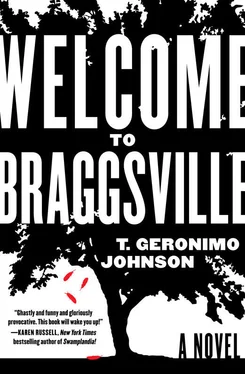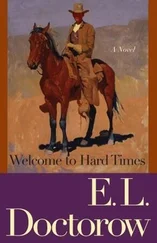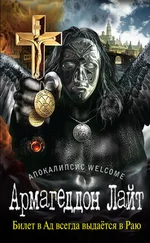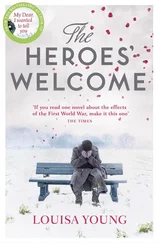One of us what? Daron finally asked, recalling Denver’s questions and what Candice had said on the phone. And the Colonel. Hadn’t Colonel Sanders said something similar?
A member of the collective.
What’s the collective?
All of us here who are members of the hunting lodge.
You mean a militia?
The postmaster rubbed his face. A deputy rooting through the refrigerator at that moment laughed. Oh, no, not that word.
The postmaster cupped his hands. Let’s talk about the M-word. We’re not a threat, a fringe group, or crazy. We’re the legacy the forefathers fought to build. We’re not antigovernment, we’re procitizenship. We’re not antigovernment, we’re anticorruption. We’re not antigovernment, we’re pro-self-sufficiency. We’re not separatists or racists, we’re constitutionalists. We judge a man by his actions, not his skin color. The Bill of Rights tells us that all men are created equal. We know our history and we revere it. We are citizens. We are your neighbors. We represent all the county — all the surrounding town. We are your anchor in this rough sea.
Daron didn’t dare ask why no one was there representing the Gully. How long?
How long what?
How long has this been here?
The postmaster laughed, the deputy joining him. How do we beat the chaos back? How did we install order in the middle of nowhere? How’d we get rid of those injuns? You may as well ask how long the Gully’s been here, or the town, or the Holler. It’s all there’s ever been. Forever.
But how could he not have known? He had known there was a hunting lodge back here, one you couldn’t join until eighteen, but he’d given up hunting long before then. How had Denver and Candice known more about his town than he did? He cursed his idiocy. I didn’t know there was a militia.
Again, it ain’t a militia. It’s a hunting lodge and we’re a collective, like those co-ops out west. We never burned no crosses or lynched no one here in Braggsville proper, least not until you came along. Let me show you something. He led Daron back to the classroom, which was, he now understood, also a recruitment office. They played him a couple of videos, handling the VCR cassettes with two hands, like relics.
Watch this.
Images of wounded U.S. soldiers and natural disasters in America, and local citizens’ brigades providing support services.
Now this.
People, mostly men, training for military action and taking an oath in front of a flag. The voice-over:
From many different cultures, and every country of the earth. Forged by only one common bond: the Constitution. The greatest enemies: domestic. Every culture, every color, one country. We do solemnly swear to the best of our abilities, to preserve, protect, and defend the Constitution of the United States of America.
That’s all we are, D’aron, citizens. Everybody knows that this nanny state can’t last. Everybody knows that and about the Bell Curve and Dr. Watson, but all we’re saying is be prepared. He handed Daron a photo album. In it were daguerreotypes and old photos of the town founders posing in front of the hunting lodge. Some of the photos, though, were death shots. He recognized Bragg and one of his sons and several town elders from the replicas in the funeral home foyer.
Now this one.
The next album was mostly in color, and he saw his parents staring back at him, his father posing in front of the lodge in a Confederate uniform, his mother at the Green Egg in the backyard. There were also photos of the local intramural playoffs, like the softball match between Lou Davis’s Cash-n-Carry and Howard’s Hide Park, the bitterest of rivals. He recalled seeing posted in local restaurants photos of youth league teams thanking the various businesses that provided support, and the hallway in the lodge was lined with them. In fact, now that he thought of it, he had seen the lodge mentioned in photos mounted elsewhere.
On each page of the album, a surprise or pleasant memory. There was Rheanne dressed as Lady Gaga. That was the Halloween he kissed Joyce Templeton on the neck. There was his first and last football game. The debate championship in Macon. The Belle Ball, where the adults get all gussied up. It was well past sundown by the time he finished the albums.
I’m glad you finally visited. Saves us the embarrassment. The postmaster looked outside. You don’t want to walk home now. Everybody knows that, even Methuselah. Besides, now that you have finally arrived, we can have our trial. The tribunal will meet tomorrow first thing, which at least one someone should be glad to hear.
Trial? I’m being—
— Whoa, boxer. Acts one-seven. It is not for you to know times or seasons that the Father has fixed by his own authority. Your arrival is not a coincidence. He has spoken. All your questions will be answered in the morning. The postmaster again looked outside. You sure don’t want to walk home now. But we’ve dressed a bed for you.
As was often the case for youth in the South, invitation meant instruction. Daron spent the night locked in a bedroom. At least it may as well have been locked. Where could he go at midnight in the middle of the Holler? It was a small room with no window and scarcely space enough for the tube-frame twin bed. The floors were bare wood, dark from years of wear, and the walls oak faded to ash. It could have been a backdrop for an Abercrombie & Fitch ad, if it weren’t for the propaganda. With no cell phone service, there was nothing to do but read. Brochures stacked neatly on the side table. A Gideon’s Bible camped out in the nightstand drawer with The Bell Curve . The code of conduct, posted on the back of the door, where the rack rates would be:
1. Good citizens make no contact with media unless first cleared.
2. Good citizens don’t proselytize or openly recruit.
3. Good citizens make no actions representing or claiming to represent the collective.
4. Good citizens do not behave in ways that could harm the collective’s public image.
5. Good citizens don’t practice foul language or behavior.
6. Good citizens practice gun safety at all times.
7. Good citizens replace what they eat.
He sat on the edge of the bed most of the night, in a fugue, feeling, when he felt anything, self-disgust. How could he not be scared or angry? Why did he feel empowered, like he had stumbled into the base of Mount Olympus and they’d thrown down a rope? He fell asleep pondering the postman’s final words.
What about the Gully? Daron had finally asked.
They got their own thing.
I thought this was for everyone.
Don’t be a waterlog, Little D, warned the postmaster, plucking a cookie crumb off his mustache. They get work, they don’t get hassled. Don’t make that turned-up face like a stranger pinched a biscuit in your toilet. Look at all we do for other countries when our own house isn’t in order. What if we rebuilt and gave jobs to the Fort Runner folks two towns over when people right here in Braggsville, like your father, need jobs? That wouldn’t be right, would it? If your father didn’t have a job right here in our community and someone over the county line did? Someone across the river? All these special interest groups. What if we didn’t look out for our own? Who would? Who will?
In the morning, oatmeal. Alone. No cinnamon or sugar. From the kitchen, Daron heard laughter often abruptly interrupted by uncanny silence, and he was glad to have feigned belly mites, to have begged off attending the liturgy and the pancake breakfast that followed it. At sunup he was led out to the barn, where men congregated by age. Under the hayloft sat Oliver Williams, Mayor K. (the previous mayor), Robert Butch Buchanan, Jim Stark, Justin Stark, and other elders. Near them stood Mark Lance, Tony Foldercap, and others from his father’s generation. Nearest the door were Josh Turner, Kevin Dole, and several of Daron’s former classmates. At the back of the barn was a long table behind which were three empty chairs, and facing the table, with his back to the crowd, stood Jo-Jo. As he was positioned, Daron could not see his hand.
Читать дальше
Конец ознакомительного отрывка
Купить книгу












